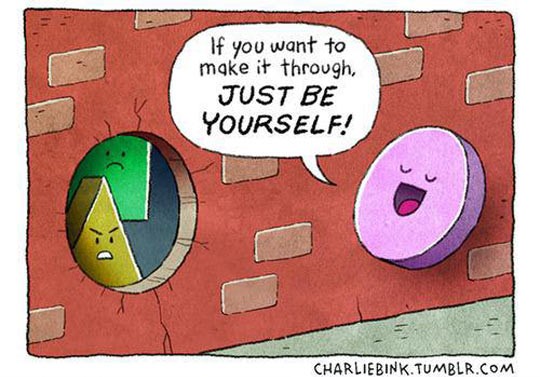
Why You Probably Shouldn’t Be “Authentic”
This is my tale of confusion, destruction, enlightenment, and rebirth.
The protagonist in this journey, of course, being myself, my guide through the inferno being a business school professor, and the River of Styx being the recently conceived trope of the “Authentic Leader”.
Let us begin.

The (virtual) Strategic Leadership course I just finished at The Tuck School of Business at Dartmouth gave us the unique opportunity to have real-life business leaders visit the class (again, virtually), lead a case discussion, and impart some wisdom on how leaders should handle the current COVID crisis.
While this was a truly exciting and edifying experience, I couldn’t help but experience a growing anxiety that coincided with the amount of times I heard the word “authentic” arise. The reason for this was simple: these guest speakers were all exceptionally polished, logistically organized, seemingly extroverted, and relentlessly optimistic.
I am none of those things.
If these guests were exhibiting these qualities, all of which are commonly highlighted as leadership qualities, while being their authentic selves, then what does that make someone like, who might display these traits sometimes but not consistently?
Easy: not a leader.
At least, that was the conclusion I drew. In all candidness, this private realization crushed me. I understood that I could simply train myself to be more “like a leader” to reduce my cognitive dissonance, which led to another question: should I? Would I exactly be “true to myself” if I made efforts to fundamentally change who “I” am?

I reached out to several Tuck professors to either confirm my dooming as a leader or to find some resources that would also confirm my dooming—albeit in a more drawn-out fashion.
One professor, Adam Kleinbaum, recommended I read Jeffrey Pfeffer’s assault on the leadership industry, titled Leadership BS as a way to ease my woes.
As soon as I started reading, it was clear that this book had been sent to me straight from Heaven…a Heaven that apparently resides in the mind of Professor Kleinbaum.

The chapter titled “Authenticity: Misunderstood and Overrated” kicked off with a few quotes that I couldn’t help but write down:
“Leaders must be able to put on a show, to display energy and pay attention to others, regardless of how they may feel at the time.
In fact, being authentic is pretty much the opposite of what leaders must do.”
I would have to say that I agree.
In many scenarios, openly expressing how you feel or stating an unfiltered opinion might actually be counterproductive to the goal of the organization. This is especially true in situations similar to the age of COVID, where bravery, optimism, and empathy are heralded as necessary traits despite the reality that many people’s private sentiments are completely contrary to these required qualities.
If a person leading a small business were to understandably feel discouragement, anxiety, and fear in these times, they would need to censor themselves and put on a more positive persona in order to keep the morale of their businesses up. While the owner is obviously not being authentic in this instance, they are behaving in a way that’s necessary given the situation.

The practice of playing (acting) a leadership role is also existent for static, non-COVID related personality traits as well. Take, for example, an introverted Chief Operating Officer’s behavior at an annual company kickoff. While walking around with enthusiasm and holding countless conversations with her subordinates might be a stark contrast to her actual personality, she will (hopefully) realize that engaging in these behaviors is simply an expectation of the role and behave accordingly. Again, while she isn’t being authentic as a leader in this context, she is certainly being effective.
Given the opinion that I’ve just laid out, it would be natural to assume that I now think that most of our guest speakers were full of shit when it came to authenticity. That is not the case at all.
The advice to be authentic, along with the other pieces of fantastic knowledge they shared, seemed to stem from a very genuine place. This, of course, leads us to a quandary: how can I find “be authentic” as misleading advice and also think that these guest speakers were being authentic?
Easy: they naturally possessed all of the qualities of being a great leader. It’s easy to be authentic as a leader when your authentic self contains several leadership traits.

Pfeffer also touches on this point: “For women, and for men, being true to oneself is only useful to the extent that someone’s true self has the qualities that make people successful. Otherwise, people need to put on, to assume, the qualities required to present themselves in the most favorable light.”
If you might find it perplexing that one might need to practice the best ways to be themselves, then you are not alone. Pfeffer remarks: “The idea that one would and could be trained to become or at least appear authentic oozes with delicious irony.” Ironic or not, if a little acting is what separates you from a purgatorial existence in entry-level roles, then so be it.
My internal journey through my own internal doubts has led to a newfound perspective: if true authenticity really is paramount to becoming a great business leader, then I am not the only person who should be nervous. Rather, I think that the understanding of what “authenticity” means in this context needs to be modified.
If your true self happens to encompass all of the traits that make someone successful as a leader, then by all mean, please be authentic. If you, like me, are not one of those blessed few, then the key to success might be signing up for an acting class.
-OSP